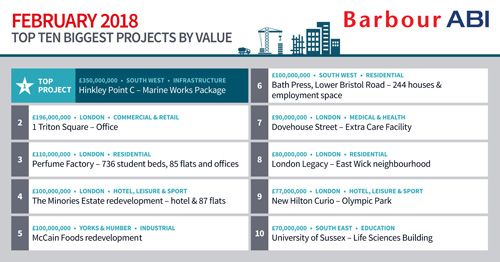 After a volatile 2017 and a poor start in January, February has reportedly not fared much better for the construction industry, with the value of new contracts awarded at £4.9 billion, which is 24% lower than at the same time last year.
After a volatile 2017 and a poor start in January, February has reportedly not fared much better for the construction industry, with the value of new contracts awarded at £4.9 billion, which is 24% lower than at the same time last year.
The latest edition of the Economic & Construction Market Review from industry analysts Barbour ABI highlights levels of construction contract values awarded across Great Britain. Residential housing dominated the construction sector across February with a total contract value of £2.1 billion, its highest figure for six months. Conversely, infrastructure contract value decreased by 48% compared with last month – even with the largest overall project in February being the £350 million Hinkley Point C – Marine Works Package.
Outside of the Hinkley Point project, the three biggest projects in February were all reportedly London-based, the £196 million 1 Triton Square office project, a £110 million residential development named the ‘Perfume Factory’ and The Minories Estate redevelopment worth £100 million.
Across the rest of the industry, the education sector followed infrastructure as the only two sectors that saw a decrease in monthly figures. Infrastructure’s decline from £1.7 billion to £875 million was too great of a loss for the rest of the industry to play catch up, even as all other sectors saw an increase in construction contract values.
Regionally, it was said to be London that led all regions with a contract award value at 25% of the UK total, largely thanks to the aforementioned three big ticket projects, which also included the three largest hotel, leisure and sport developments in February which totalled over £200 million. This was followed by the South West with 17% of the contract award value and the North West with a 13% share.
Commenting on the figures, Michael Dall, lead economist at Barbour ABI, said: “Whilst the slide in infrastructure is disappointing, it is encouraging to see the increases in value for the majority of the construction sectors, particularly commercial and retail, which was in the midst of a three-month slump. With uncertainty surrounding the industry and economy in general, improvements in various sectors should instil confidence, despite the overall figure being subdued.”



